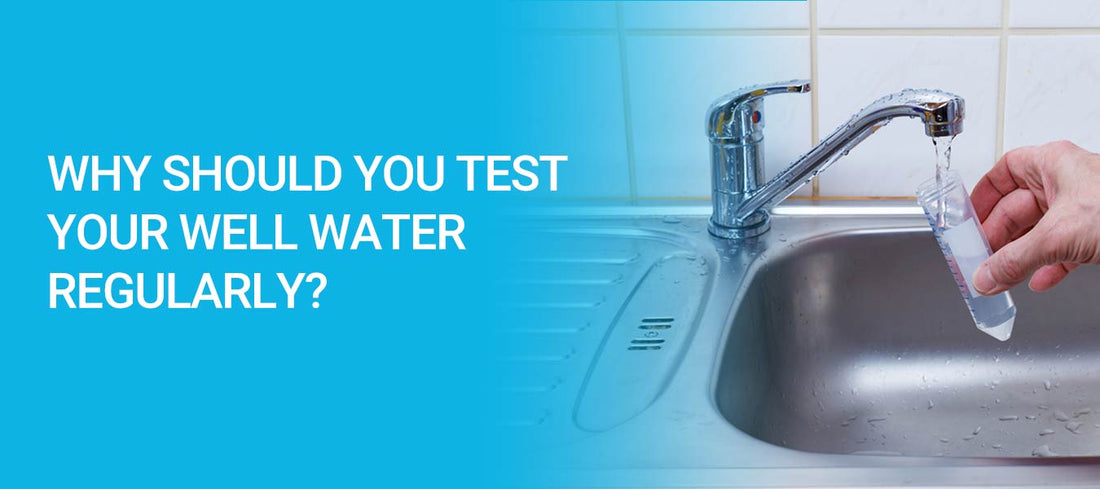In Ireland, nearly 11% of the population depends on private wells for drinking water and other household uses. Because private wells are not regulated in the same way as public water supply, homeowners using them are responsible for ensuring that their water supply is safe. While most private wells provide a clean and safe supply of water, contaminants can pollute private wells. Depending on environmental factors, local development, and even industrial accidents, all of these wells can be at risk of contamination at one time or another. Because you cannot see, smell or taste most contaminants, you should test your water regularly. In this we discuss, common water problems faced by private well owners and how getting it tested regularly would help them maintain drinking water quality.
What Contaminates Well Water?
Private wells source from groundwater. As rain passes through soil and rocks, water may dissolve minerals, as well as other potential contaminants from nearby sources. As water passes through pipes and plumbing, other substances may also enter the water supply. These issues can lead to changes that affect the taste, smell or appearance of well water, or they can cause hardness. Hard water can produce buildup on plumbing fixtures as well as leaving spots on dishes while impacting the performance of water-using appliances. If your well was drilled too close to the surface it can become susceptible to microorganisms such as coliforms and E.Coli. They sometimes enter water supplies through cracks in well casings, poorly sealed caps, fractures in the underlying bedrock, and runoff into sinkholes. Depending on the condition of the local soil, groundwater can pick up nitrates, nitrites, copper, and other impurities. The use of chemicals and fertilizers in areas surrounding a well can also easily pollute the water.
What Should You Test For?
Basic tests to consider for your water include Coliform (bacteria including E. coli), and chemical analysis. A full chemical test would include calcium, magnesium, chloride, nitrate, potassium and sodium along with metals such as iron and manganese. If you’re encountering stains or sediment, chemical analysis of water will reveal what is causing the problem. These tests show if the water will be corrosive to piping, or form limescale deposit in your pipes, and the levels of minerals and salts causing the issues. A microbiological test, on the other hand, would test for microorganisms such as total coliforms and E.Coli in water. We, at Celtic Water Solutions, offer detailed water test which includes comprehensive analysis for E Coli, total coliforms, TBC, aluminium, iron, manganese, ammonia, nitrite, pH, colour, conductivity, hardness, turbidity to give you 10 times more accurate results than a regular home testing kit. Our service includes a qualified technician from our team coming over to collect water samples. This ensures the right sampling techniques are followed and the sample is safely sent to an INAB-accredited laboratory for analysis. Once the test results are received, we will go over the report to help you interpret the results and suggest the next course of action.
How Often Should You Test Your Well Water?
Unlike public water supply that is tested regularly before it is piped into homes and businesses, those who own private drinking water wells are responsible for testing their water to ensure it is safe to drink. Contaminated well water often doesn’t have easily noticeable signs to alert you of the potential hazard. You may not be able to easily detect many of the contaminants that can be picked up by well water. This is because they are colourless, odourless, and tasteless. For this reason, the best way to detect these contaminants is with a well water test.
Test your drinking water if any of the following occurs:
- the land near or around your home has been displaced or reconfigured by well drilling, extensive yard work, or construction projects involving large equipment or trucks
- the activities of a neighbour or nearby business involve chemicals or petroleum products
- flooding
- a chemical spill or leak on or around your property
- septic system malfunctions
- ongoing gastrointestinal illnesses among the residents in your home
It is recommended that people who are served by private water wells test their water at least once every year and alter the time of testing so you get a holistic annual picture of what’s going on with the well and its water quality.
Should You Test Well Water More than Once a Year?
The advice to test well water quality on an annual basis is a minimum recommendation. There may be times when more frequent testing is required. If you notice something unusual, such as the odour, flavour, or appearance of your well water, have it tested. Any unexpected changes in water quality should be a cue that it’s time to test. Cracks or openings in your well cap can happen at any time exposing it to bacterial contamination. If tests reveal elevated levels of a potentially harmful contaminant, follow-up tests for ongoing monitoring may be necessary.
What Can You Do if Water Testing Reveals Problems?
The majority of the time when water test results reveal a problem, rest assured that there are ways to treat the issues and achieve the right water quality. Based on your test results, we can offer specialized
well filtration systems to treat problems detected in your water. No matter if you have excessive lime in water, unpleasant smells, or bacterial contamination, we have a solution for you. We have nearly 20 years of experience treating wells across Ireland and over the years helped thousands of families improve their well water quality. Our bespoke solutions are customized as per your water test results giving you complete peace of mind. There are local authority
water treatment grants, which cover 100% of the costs, subject to a maximum of €1,000. We can help you determine if you qualify for a grant and assist you in the application process. If you need more information on water treatment grants, feel free to contact our team of experts.
Speak to an Expert

